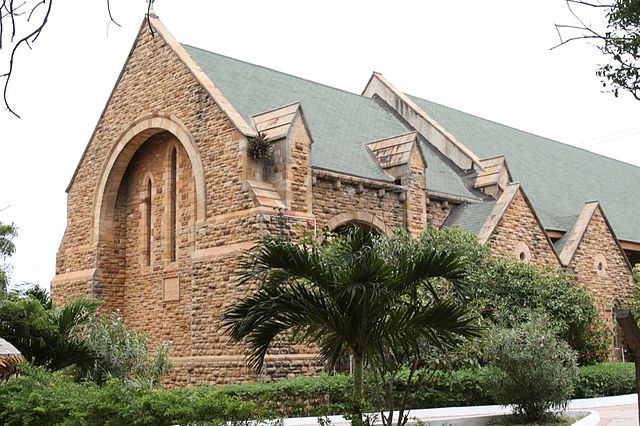
Julie Slater
For many years, the Republic of Ghana was under British colonial rule. In 1957, Ghana became the first country in Sub-Saharan Africa to become independent. Although the British no longer governed, their strong Christian influence remained.
Today, Ghana is divided into ten administrative regions, and has a population of 24.6 million, including 75 ethnic groups. There are two main religions in Ghana: Christianity and Islam. According to a 2010 census, 71.2% of the population of Ghana is Christian (28.3% Pentecostal, 18.4% Protestant, 13.1 % Catholic and 11.4% other), 17.6% is Muslim, 5.2% is traditional, and 5.2% have no religion. Many individuals who report they are Christian and Muslim, however, also practice traditional beliefs.
In Ghana, geography is often related to religious identity. The Muslim population is mostly located in the northern parts of Ghana and in urban areas, while most of the adherents to traditional religion live in rural areas. Christians are spread throughout the country.
CONSTITUTIONAL PROVISIONS AND RELIGIOUS LEGISLATION
Early History
When Ghana was granted independence by Great Britain in 1957, it drafted its first constitution, which established a constitutional democracy. A second constitution in 1960, established Ghana’s first republic.
Ghana’s first two constitutions lacked extensive provisions securing fundamental human rights for the people. But the government passed legislation prohibiting religious discrimination. For example, in 1957, the Avoidance of Discrimination Act was passed to “prohibit organizations from using or engaging tribal, regional, racial or religious propaganda to the detriment of any other community, or securing the election of persons on account of their tribal, regional, or religious affiliations and for other purposes connected therewith.” Then, in 1961, the Education Act was passed to prevent discrimination in schools based on a student’s religion. The Education Act mandated that no student could be refused admission on account of religion and no inquiry could be made regarding a student’s religious beliefs.
In 1966, there was a military overthrow of Ghana’s first republic. When Ghana returned to civilian rule in 1969, the government implemented a new constitution. Participants in the 1968 Constitutional Commission, which was organized to draft the third constitution, specifically expressed their desires to protect religious freedom. Accordingly, the 1969 Constitution guaranteed freedom of thought and freedom of religion, guarantees that were also included in a subsequent 1979 Constitution.
PNDC and the Religious Bodies Registration Law
In 1981, a military coup again thwarted democracy in Ghana. Flight Lieutenant Jerry John Rawlings seized power and established the Provisional National Defense Council (“PNDC”) to rule the country. The PNDC passed a law suspending Ghana’s 1979 Constitution. However, the very same law that suspended the Constitution—The Proclamation Law of 1982—also stated that the “‘Directive Principles of State Policy’ would be the ‘respect for fundamental human rights and for the dignity of the human person [which] are to be cultivated among all sections of the society and established as part of the basis of social justice.”
Despite its alleged commitment to human rights, the PNDC passed legislation that limited religious freedom. In 1989, the PNDC passed the Religious Bodies Registration Law, which required all religious organizations to apply for registration through the Religious Affairs Committee. The Religious Affairs Committee would decide, together with the National Committee on Culture, if the government would recognize the religious organization. The law also gave the government the right to inspect church facilities and audit religious institutions. Any religious organization that failed to comply with the conditions of the Religious Affairs Committee could be criminally prosecuted and the organization’s assets could be confiscated.
The stated purpose of the Religious Bodies Registration Law was to “protect Ghanaians from the exploitative tendencies of some Churches,” and to “preserve the purity of religious teachings.” The Ministry of the Interior at the time, however, asserted that the law was created because “certain individuals and groups [were] using or planning to use church premises as meeting grounds in furtherance of their political schemes and because church premises had already been used for activities calculated to undermine national unity.”
While some new religious organizations were anxious to register because they hoped registration would increase their legitimacy, many older churches openly resisted the Religious Bodies Registration Law and refused to register.
Two religious organizations were banned in Ghana in conjunction with the law: the Jehovah’s Witnesses and The Church of Jesus Christ of Latter Day Saints, also known as the Mormon Church. Jehovah’s Witnesses were banned because they allegedly failed to “show[] proper respect for the symbols of Ghana’s government.” The Mormons were accused of practicing racism within the religion. Both organizations had to close their church facilities under the ban, and were forced to leave Ghana. The bans were later lifted after the churches agreed to make changes.
Ultimately, the refusal of large churches to register, and the passage of a new constitution, eventually resulted in the Religious Bodies Registration Law being repealed in 1992.
For more information, see the link below: